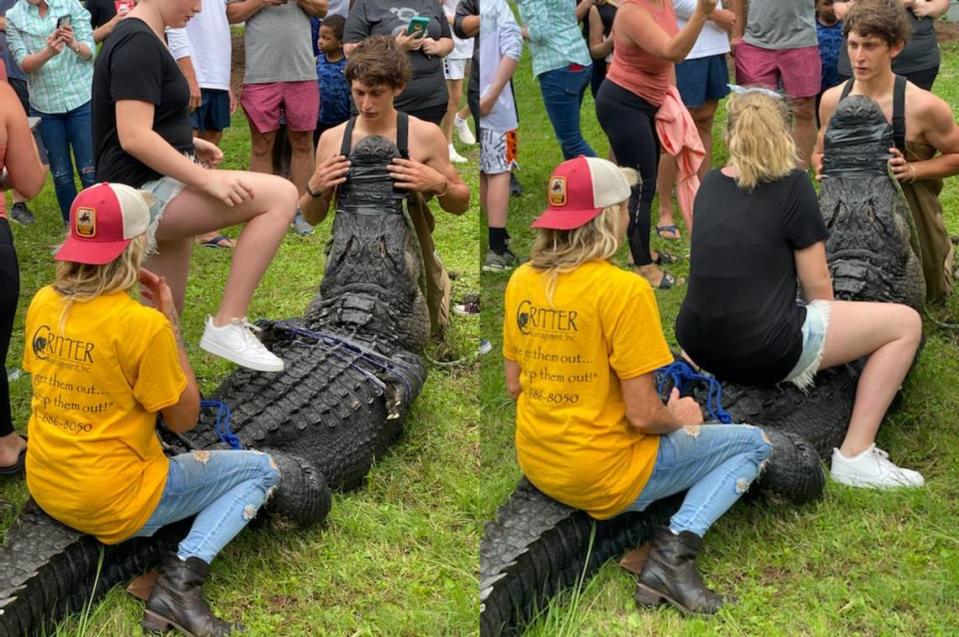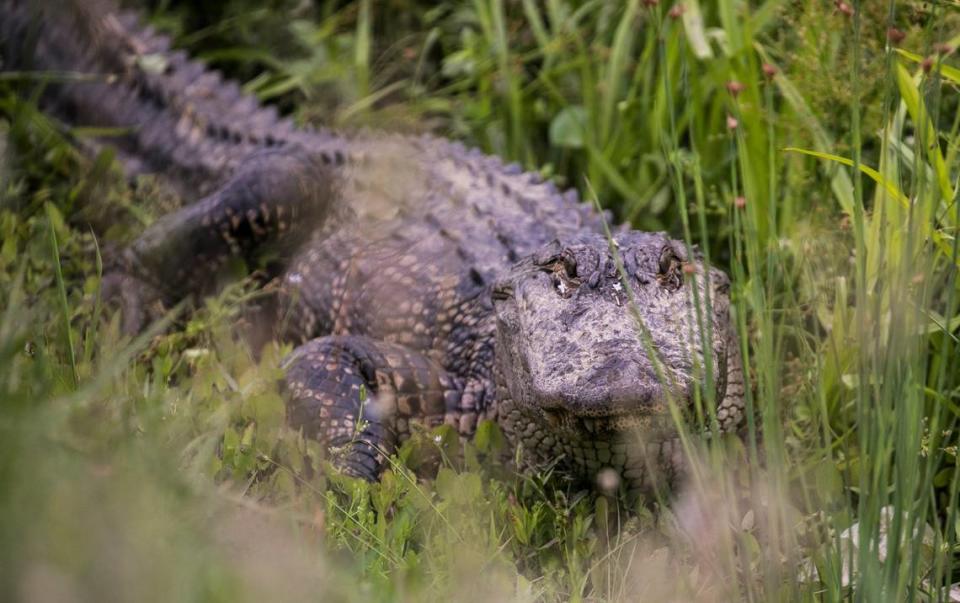‘Bored’ teenage tourists tie up alligator during vacation on Hilton Head, police say
Officers from the Beaufort County Sheriff’s Office responded to a report last week of three teenagers capturing an alligator.
Their defense? The Connecticut tourists said they were “bored.”
When police arrived at the house on Sandcastle Court, a rental property near Folly Field Beach on Hilton Head Island, they found a young alligator thrashing in a pond. The alligator, approximately five feet long, had a nylon rope wrapped around its neck and arm. The other end of the rope was tied to a nearby fence.
Police approached three teens in the backyard, who were on vacation with their family. The group had seen the alligator swimming in their backyard pond and, driven by boredom, decided to capture it.
The youths, ages 16, 16 and 19, tied a slipknot with nylon rope and fed it into the pond, throwing objects at the alligator until it swam near the rope, according to Maj. Angela Viens, a spokesperson for the Beaufort County Sheriff’s Office. The teenagers then pulled the rope as the alligator swam through the knot, capturing the animal. As the alligator thrashed to free itself, the cord became even more tangled.
Police were able to cut the cord from the alligator’s neck and release it back into the pond. A parent was notified, and the three teenagers involved were issued citations from the S.C. Department of Natural Resources totaling $260 each, according to Greg Lucas, a spokesman for DNR.
Police are not sure whether the alligator was injured, Viens said.

The incident continues a trend of alligator mistreatment in Beaufort County. Just one month earlier, video surfaced of a man on Fripp Island illegally harassing an alligator by picking the animal up by its tail and throwing it into the air. Police are still searching for the individuals involved.
Also on Fripp Island, a man was charged with harassing an alligator in 2021. In 2020, an alligator was euthanized after being pulled from a pond at a mini-golf course on Hilton Head, with bystanders “riding” the captured animal before it was relocated by DNR.
This spring, the State House passed a bill that would increase penalties for alligator mistreatment. Under the new legislation, feeding, enticing or harassing an alligator is punishable by fines of up to $1,000 or 30 days in jail, and illegally hunting an alligator can cost South Carolinians up to $2,500 or 90 days in jail.
The American alligator is native to South Carolina. Although it was once listed as a federally endangered species, populations have rebounded and its status has been upgraded to threatened. The DNR instituted a hunting season in 2008.

Here’s a list of SCDNR recommendations for alligator encounters:
Don’t feed alligators. This is a most important rule as feeding alligators threatens the safety of both people and animals. Providing food for these wild animals makes them bolder and encourages them to seek out people
Keep your distance. Although they may look slow and awkward, alligators are extremely powerful and can move with a startling burst of speed on land over short distances.
Do not attempt to move alligators out of the road. If you see an alligator on the move, leave it alone and let it pass on through. Alligators move the most in spring and summer when they are breeding.
It is illegal to harass or throw things at alligators. They are living organisms that warrant respect and it is not productive to annoy them.
Never disturb nests or small alligators. Some female alligators protect their young and may become aggressive if provoked.
Do not attempt to keep alligators as pets. Keeping a baby alligator as a pet is a foolish idea, not to mention illegal in some states.
Keep your pets and children away from alligators. Large alligators do not recognize the difference between domestic pets and wild food sources.
It is best to avoid swimming in areas that are known habitats for large alligators but at the least, never swim alone.
Do not corner alligators if participating in recreational activities, such as skiing, canoeing, kayaking, or even taking photographs.


